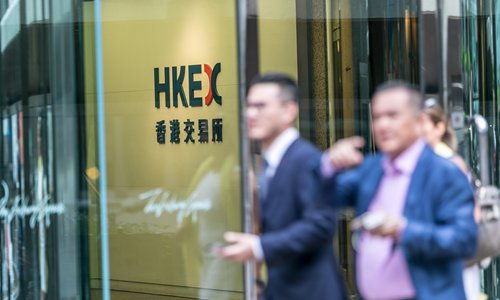HK bourse to launch dual counter model in June, will enhance yuan’s internationalization: expert

Pedestrians pass by the office of HKEX in Hong Kong. File photo: VCG
With the launch date settled for the long-awaited Hong Kong dollar-yuan dual counter model, another important innovation in Hong Kong's stock market, the city's role as a leading offshore yuan market will be consolidated and the internationalization of the Chinese currency will be accelerated, an expert said on Sunday.
Hong Kong Exchanges and Clearing (HKEX) announced over the weekend that it will launch the dual counter model and market making system in its securities market on June 19. The move will support the trading and settlement of yuan-denominated securities in Hong Kong, the HKEX said in a statement.
Investors will be able to seamlessly interchange securities listed in both Hong Kong dollars and yuan. Securities on both counters will be of the same class and can be transferred without any change of beneficial ownership.
Dong Shaopeng, a senior research fellow at the Chongyang Institute for Financial Studies at Renmin University of China, told the Global Times on Sunday that in the short term, the new model will widen the channel of cross-border two-way capital flows and improve liquidity, trading volume and activity in the Hong Kong stock market.
"In the long run, yuan-denominated investment products and risk management tools in Hong Kong will consolidate and enhance the city's status as the world's leading hub for offshore yuan trading and an international financial center," Dong noted.
"The new model is another key milestone in the development of Hong Kong's capital markets. It will give issuers and investors more choices, it will enrich Hong Kong's yuan-denominated products ecosystem, cementing its role as the world's leading offshore yuan hub, and it will support the ongoing internationalization of the yuan," HKEX Chief Executive Officer Nicolas Aguzin was quoted as saying in the statement.
HKEX will hold testing and practice sessions this month and in early June to help market participants adapt, the operator said.
HKEX introduced the dual counter mechanism in December. Since the beginning of this year, Hong Kong-listed companies have accelerated their applications for yuan counters, with the number tallying 24.
Chinese e-commerce giant Alibaba Group said Thursday that it had applied for the addition of a yuan counter to support the dual counter model.
Most of the applicants are actively traded companies with high market capitalizations including internet giants like Baidu and Tencent and financial firms like Ping An.
Hong Kong's economic and financial connection with the Chinese mainland under the One Country, Two Systems policy has become a unique advantage for its financial industry, which is reviving its vitality, Dong said.
In Hong Kong, yuan deposits totaled nearly 1 trillion yuan ($145 billion) as of the end of 2022, and about 75 percent of global offshore yuan settlements are handled in Hong Kong, official data show. However, offshore yuan investment is limited to a few sectors including deposits, government bonds, insurance and wealth management.
In the budget plan outlined by Hong Kong Financial Secretary Paul Chan Mo-po in February, the special administrative region's government will promote the offshore yuan business by offering yuan settlement of carbon credits and potentially opening new futures markets in Chinese mainland bonds.



